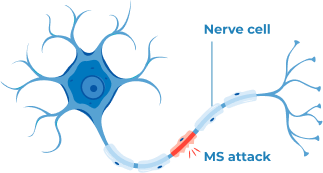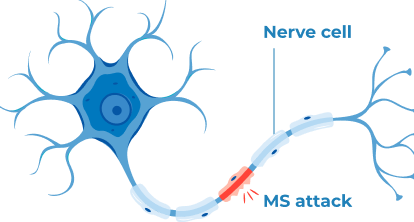1-833-ZEPOSIA
ZEPOSIA is a once-daily pill for adults with relapsing multiple sclerosis (MS).
Take as directed by your doctor if certain liver problems exist.
ZEPOSIA is a once-daily pill for adults with relapsing multiple sclerosis (MS).
Take as directed by your doctor if certain liver problems exist.
About MS
The signs of relapsing MS can be both visible, such as signs caused by relapses, and invisible, such as new or enlarging lesions. These signs vary from one person to the next and can even change in the same person over time. But understanding the condition better can help you and your healthcare provider find a treatment option that's right for you.
MS medical terms you should know
When talking to your healthcare provider, it’s important to discuss both the physical and cognitive symptoms of MS. Use the terms below as a tool to help with your MS research.
When a new MS symptom occurs, or an existing symptom gets worse, it’s defined as a “relapse” (or “exacerbation” or “flare-up”). This symptom must last more than 24 hours and be separated from the previous relapse by at least 30 days. The severity and duration of a relapse is often unpredictable. No 2 relapses are alike, but most last from a few days to several months.
An MS lesion is an area of damage or scarring that can occur throughout the central nervous system, including the brain.
Lesions often progress over time, and this progress is monitored by using magnetic resonance imaging (MRI) scans.
Everyone loses brain volume as they age, but for people with MS, it can happen more quickly. The brain is made up of white matter and grey matter.
- White matter is where signals pass from one part of the brain to another (and to the rest of the body)
- Grey matter is found on the surface of the brain and deep within it. These are areas where communication signals begin
Cognitive processing speed is a way to show how quickly the brain is able to receive information, process it correctly, and react to it.
Your healthcare provider may choose to measure your cognitive processing speed using the Multiple Sclerosis Functional Composite (MSFC), a common evaluation for people with MS, which is made up of 3 tests:
- The Symbol Digit Modalities Test (SDMT), which evaluates a person’s ability to review, assess, and process information, and then perform a task based on that assessment
- The 2 other tests include the 9-hole peg test and the timed 25-foot walk

Talking to your MS specialist
It’s important to discuss both the physical and cognitive symptoms of MS at your next appointment. So, how can you prepare?
- Answer a few questions below to get a customized discussion guide for your visit
- Get to know the MS terms above and ask your healthcare provider to make them part of your conversation

First, a little background.
(Section 1 of 3)

Let’s talk about your current treatment plan
(Section 2 of 3)

How does treatment fit into your lifestyle?
(Section 3 of 3)
When were you diagnosed with MS?
Which MS symptoms have you experienced in the last 6 months?
(Select all that apply)
Once a symptom is selected, indicate how it has changed in the last 6 months.
Feeling very tired or decreased strength
Numbness or tingling
Problems with coordination
Problems walking
Vision problems
Dizziness or vertigo
Sexual problems
Pain or muscle spasms
Speech problems
Bladder or bowel problems
Trouble remembering things
Difficulty concentrating
Emotional changes
Other
Are you currently treating your MS?
How satisfied are you with your current treatment?
What are some important factors to you when considering an MS medication?
(Check all that apply)

Thank you for your answers!
Scroll down to review and save your personalized discussion guide. Sharing this information may help your MS healthcare team better manage your MS.
E-mail or download your responses below and share with your MS healthcare team at your next appointment.
MS discussion guide sent!
Check your e-mail at the address provided. Be sure to check your spam folder if the results have not arrived within several minutes.
Thank you!
You'll receive an e-mail from us on the date you selected. Be sure to check your spam folder if the results have not arrived by that time.
My personalized MS discussion guide
Keep this handy when talking with your MS healthcare team about treatment options. It can help guide the conversation.

My MS background
I was diagnosed with MS:
Less than 1 year ago.
Not currently experiencing any symptoms.
I have experienced the following MS symptoms in the last 6 months:
| Feeling very tired or decreased strength | Worse |
|---|---|
| Numbness or tingling | Same |
| Problems with coordination | Better |
| Problems walking | Increased |
| Vision problems | Increased |
| Dizziness | Same |
| Sexual problems | Same |
| Pain or muscle spasms | Same |
| Speech problems | Same |
| Bladder or bowel problems | Same |
| Trouble remembering things | Same |
| Difficulty concentrating | Same |
| Emotional changes | Same |
| Other | Same |

My current approach
I am currently treating my MS.
I am very unsatisfied with my current treatment. There is room for improvement with my current treatment. I am satisfied with my current treatment.

My lifestyle considerations
The following are important to me when considering an MS medication:
How often the medication needs to be taken.
Whether the medication requires refrigeration.
Whether a treatment requires ongoing travel to a healthcare facility to be administered.
How affordable a mdication is (including availability of financial support options).
For those considering ZEPOSIA
Additional questions to talk about with my MS healthcare team:
What impact could ZEPOSIA have on my MS?
What are the most common side effects?
Is ZEPOSIA a good option for me? Why?

A closer look at MS
In all types of MS, the body’s immune system attacks the central nervous system (CNS), which consists of the brain, the optic nerves, and the spinal cord.
When MS attacks happen, CNS tissue is damaged and lesions can occur
Lesions disrupt the CNS and keep the brain from sending signals to the rest of the body. These “signal breakdowns” can lead to MS symptoms.
Nerve cell
The nerves within the CNS are covered by a protective coating called myelin.

MS attack
MS attacks the myelin, causing damage that can prevent the CNS from functioning like it should.

The types of relapsing MS
Although there is no way to predict relapsing MS from one person to another, there are three different common types of relapsing MS.
CIS is the first “episode” of MS symptoms. To be considered CIS, these symptoms must last at least
This is the most common form of MS, as 85% of people with MS are diagnosed with RRMS. This type of MS is defined by attacks of new or worsening neurological symptoms called “relapses.” Relapses can often be followed by periods of partial or complete recovery, called “remissions.”
RRMS can be categorized as “active” with relapses and or new MRI activity over a specific period of time, or “not active,” and as “worsening” with an increase in disability progression after experiencing a relapse or “not worsening.”
SPMS initially follows the course of RRMS, which can progress to “active SPMS.” This type of MS is categorized by frequent relapses and a progressive worsening of neurological function and disability over time.

Ways to manage MS
One of the ways to help treat MS is with a type of medication called a disease-modifying therapy (DMT). Making healthy lifestyle choices is another way to help manage MS.
How DMTs may help:
- Reducing the number of MS relapses and lesions
- Preventing the development of new lesions
- Impacting the progression of the disease
How should DMTs be used?
According to The Use of Disease-Modifying Therapies in Multiple Sclerosis, it is important to:
- Begin treatment as soon as possible after being diagnosed, since MS is a progressive disease that can get worse over time
- Maintain ongoing treatment unless otherwise directed by your MS healthcare team. Gaps in treatment can be associated with increased relapses and disability progression over time
To manage symptoms, look beyond DMTs
DMTs are not meant for managing MS symptoms day to day. However, there are other types of medications that can help. Talk to your MS healthcare team to learn more.
Lifestyle choices can help, too
Making healthy lifestyle choices such as staying active, getting enough sleep, and eating right can help with MS. To learn more, visit CanDo-MS.org.
The information on this page comes from sources that include:
Brain health: time matters in multiple sclerosis
Giovannoni G, Butzkueven H, Dhib-Jalbut S, et al. Mult Scler Relat Disord. 2016;9(Suppl 1):S5-S48.
Cognitive changes
National Multiple Sclerosis Society.
Accessed February 7, 2024. https://www.nationalmssociety.org/Symptoms-Diagnosis/MS-Symptoms/Cognitive-Changes
Disease-modifying therapies for MS
National Multiple Sclerosis Society.
Accessed February 7, 2024. https://nms2cdn.azureedge.net/cmssite/nationalmssociety/media/msnationalfiles/brochures/brochure-the-ms-disease-modifying-medications.pdf
Managing relapses
National Multiple Sclerosis Society.
Accessed February 7, 2024. https://www.nationalmssociety.org/Treating-MS/Managing-Relapses
MS signs & symptoms
National Multiple Sclerosis Society.
Accessed February 7, 2024. https://www.nationalmssociety.org/Symptoms-Diagnosis/MS-Symptoms
Practice guideline recommendations summary: Disease-modifying therapies for adults with multiple sclerosis
Rae-Grant A, Day GS, Marrie RA, et al. Neurology. 2018;90(17):777-788.
The use of disease-modifying therapies in multiple sclerosis: principles and current evidence.
A consensus paper by the Multiple Sclerosis Coalition
Costello K, Kalb R.
Updated June 2019. Accessed February 7, 2024. http://www.nationalmssociety.org/getmedia/5ca284d3-fc7c-4ba5-b005-ab537d495c3c/DMT_Consensus_MS_Coalition_color











